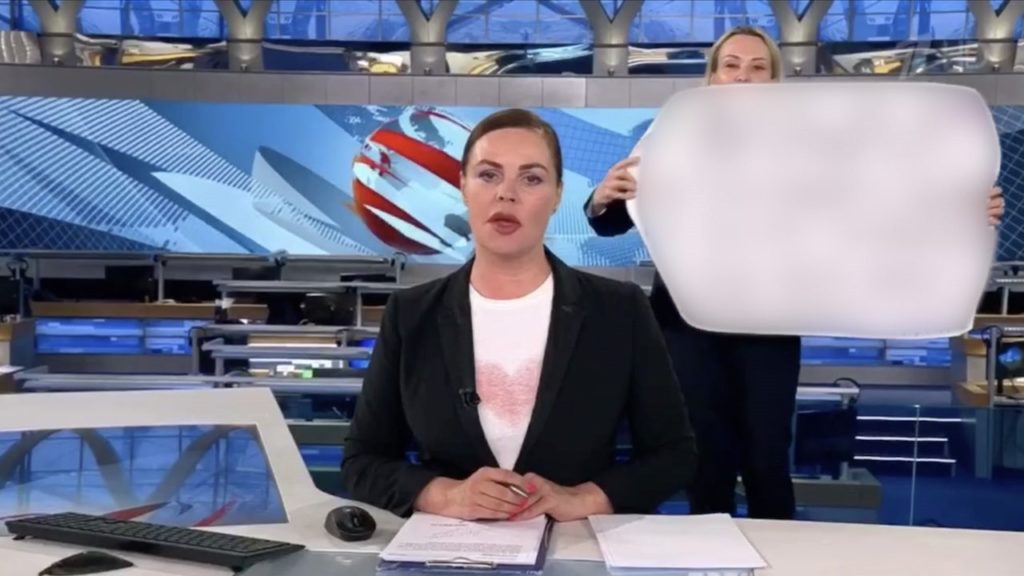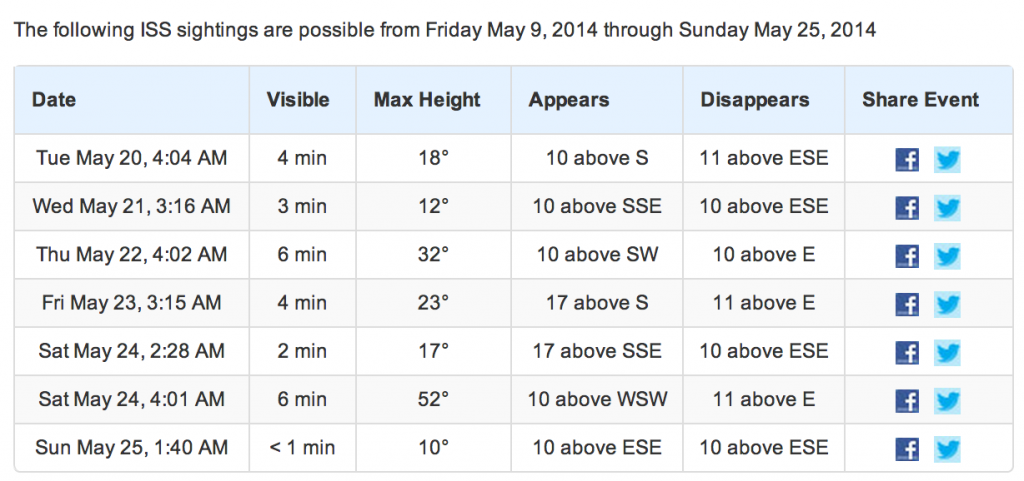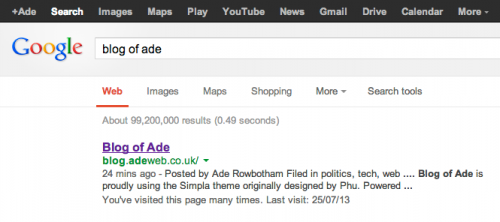“Я люблю русский народ. Вот почему я должен сказать вам правду. Пожалуйста, смотрите и делитесь.”
Arnold Schwarzenegger
The video is below but it is being cropped because of the shape.
You can view or download the video directly here >
“Я люблю русский народ. Вот почему я должен сказать вам правду. Пожалуйста, смотрите и делитесь.”
Arnold Schwarzenegger
The video is below but it is being cropped because of the shape.
You can view or download the video directly here >
14 March 2022
Via max seddon on Twitter:
A woman burst onto Russia’s main live evening newscast today with a sign that says: “Stop the war Don’t believe propaganda They’re lying to you” And chanting: “Stop the war! No to war!”
The anti-war protester who crashed the news broadcast is Marina Ovsyannikova, an editor at Channel One, says @pchikov, whose legal defense foundation is going to defend her against charges of “discrediting the Russian armed forces.” She’s already at the police station.
Ovsyannikova also appears to have recorded a video beforehand in which she blames Putin for the war and apologizes for her work on Russian state TV news.
English translation:
"What's happening in Ukraine is a crime, and Russia is the aggressor. The responsibility for this aggression lies with one man: Vladimir Putin. My father is Ukrainian, my mother is Russian, and they were never enemies. This necklace [shows] Russia must stop this fratricidal war."
"Unfortunately, for the last few years I've been working for Channel One. I've been doing Kremlin propaganda and I'm very ashamed of it – that I let people lie from TV screens and allowed the Russian people to be zombified."
"We didn't say anything in 2014 when it only just began. We didn't protest when the Kremlin poisoned Navalny. We just silently watched this inhuman regime. Now the whole world has turned away from us, and ten generations of our descendants won't wash off this fratricidal war."
Max Seddon adds:
To give you an idea of how sweeping the wartime censorship laws are in Russia: Novaya Gazeta, Nobel laureate Dmitry Muratov’s paper, published a picture of Ovsyannikova’s protest that looks like this

BBC News has added TOR mirror sites with news in both Ukrainian and Russian
Further to yesterday’s post which I’m told was a bit technical here are three things I have re-shared from Twitter, for the benefit or those blocked from seeing it
If enough of us take action we can help to get the truth to where it is desperately needed inside Russia. Flood the web with more content than they can possibly handle.
Whenever possible I prefer to take the train. When it's not overcrowded it feels quite civilised. But from where I live (Stamford) it's almost always considerably cheaper to drive. If I need to get to London in the week for an early meeting it's the best part of £110 return (or 2 singles) on East Coast unless I choose a specific and inconveniently early or late train, which usually means hanging around for a few hours. And this is with East Coast being state owned. Now that Virgin and Stagecoach are taking it over prices can only go one way.
This weekend I want to visit my brother in Brighton for his birthday, and this is going to cost me £75.80* (advance, off-peak only) and it will take around 3 hours 50 minutes on 3 different trains plus the Victoria Line between King's Cross to Victoria.
By car – based on my car's average MPG – the petrol will cost me about £40 for the round trip. And if I avoid the Friday M25 peak traffic it'll take around 2 hours and 45 minutes.
So not only is it quicker in this case, it's also cheaper to drive (OK, you have to allow for the fact I bought the car in the first place) even with only me in the car. If I had one or more passengers it would be a no-brainer.
It's obvious that the government has little interest in infrastructure outside of London getting people our of their cars and onto public transport.
If you live in London it's a different story of course. I had no need for a car when I lived in the capital. It's a transport utopia.
Grumble grumble. I might fork out for the train anyway. Quite an expensive way to read a book.
[EDIT]
It has been brought to my attention that I omitted one of the key benefits of travel by rail: Train Beers. The freedom to just sit back and tuck into a 4-pack of over-priced Stella trumps all other factors obviously. It should be noted that, by definition, train beers are not Train Beers if bought cheaply from the off license.
(*Yes there are some cheaper tickets on non-express trains, but for me the whole point of traveling by train is speed.)
At 05.45 on a weekday morning before work in March 2012, I trudged out into the back garden to look up at the sky. It was before dawn and overcast.
I'd signed up for Spot The Station email alerts some months earlier but had since stopped paying attention to them. Then someone I follow on Twitter mentioned that the ISS was due over Cambridge the following day. I don't live far from Cambridge (not that, given the station's orbital height is 370km, the exact location is important) so I checked the latest NASA email to find the exact time and where in the sky I should be looking.
The information they provide is incredibly detailed. Here are the forthcoming sighting times for where I live:

Given the overcast sky it didn't look promising but in the minute leading up to the specified time the cloud broke up so it seemed like there was a chance of spotting the station intermittently depending on its path.
Something like 20 seconds into the scheduled minute of appearance (just late enough for me to concede that I'd probably got the time wrong), the ISS slipped majestically into view and I stood with my neck craned for the roughly three minutes it took to cross the sky to the far horizon. With the naked eye it's just a point of light but impressive nonetheless. All remaining cloud broke up ahead of it so the entire transition was uninterrupted. And as it passed the zenith I goofily and self-consciously waved up at the crew.
30 minutes later I was driving, as I did at the time, to Peterborough railway station to catch the East Coast service to King's Cross. Radio 4 brought news of renewed clashes in the Gaza Strip. Several teenagers had been killed in an explosion.
Sometimes, usually when tired, I'll slip into an unusually contemplative state of mind where I become fixated on how some remote observer might view our species. This is influenced, among other things I suppose, by Carl Sagan's Pale Blue Dot. It can be a bit overwhelming to consider our collective daily goings-on in the un-blinkered context of our little planet hurtling through the bewildering infinity of space. This is by no means a unique or uncommon train of thought, I'm sure...
But this was one of those moments. Watching that speeding point of light that morning had brought a sense of marvel at what we can achieve when intelligent, inquisitive people work together. Projects like the ISS and the LHC at CERN are for me great symbols of hope. And yet at the same time the great Shakespearean tragedy of human conflict continues to play out. The juxtaposition of the two that morning forced me to pull over for a moment to compose myself.
...
Disappointingly, last week, amid rising tensions between Russia and the US over Ukraine, Russia threatened to pull the plug on the ISS partnership.

If you work in, around and underneath websites for a living it's likely (and indeed desirable) that you'll become acclimatised to using a lot of technical terminology and acronyms. But it's easy to lose touch with how much of that people outside the industry actually understand.
Jargon has its place but I'll actively try to avoid using any terms that I think might be lost on my audience in any given situation. I've always hated it when 'techies' appear to be trying to impress people by blinding them with science, and I never want to be that guy. So when talking to clients I often find myself treading that fine line between confusing and patronising them, constantly tweaking the tech-level to ensure that they're still with me.
This of course means I have to make some assumptions: "They'll probably know what X is, but I'd better briefly explain Y". But occasionally I'm way off, as happened the other day.
I recently made a site for a work acquaintance of my wife – just a small job for a local business. I knew it was likely that this client would be near at the non-technical end of the spectrum but I wasn't prepared for one phone conversation in particular, and it took me a while to figure out what they were doing wrong.
The site has a very simple and stripped back CMS content management system that allows them to add, edit or remove products, and I'd given them printed instructions for getting into the system, which went along the lines of:
And I'd done a face-to-face demo.
A week after handing over the instructions I received a message asking me to call urgently because they couldn't get into the admin system. Digging for a more specifics I asked them what browser they were using, though judging from the 'Umm...' response I may as well have asked them what their subnet mask was.
OK, no problem. I think I recall they have IE9 on their laptop. That should be fine.
And then they said "The admin page isn't showing up, nor is the contact page actually". That was weird. I fired up a Windows / IE9 image in VirtualBox and loaded up the site. Sure enough, 'Contact us' was there on the menu and it linked correctly to the 'Contact us' page (of course there wasn't supposed to be a public link the admin area but hey we'd get to that).
"Really? You mean you can't see the contact page at all?"
"No, it's only showing home and the about us page."
Then the penny dropped – they were going to a search engine instead of typing the address in. They were talking about which pages were showing up in the search results.
I explained that they needed to type in the link exactly as I had printed it into the address bar, but the term 'Address bar' was apparently unfamiliar technical jargon to them.
Finally, after advising that they include "...the 'http' bit. Yes, with the colon, and yes the two slashes as well", we got there and they were away.
Good.
Now I'm a big fan of the unified search and address bar that's been adopted across all the major desktop browsers. But thinking about it, it appeared first in Chrome and what Google wants is obviously more traffic to Google.com. The unified search bar surely delivers this. Increasingly people get to places via search even if they already know the URL because Google is so fast that it's still quicker than typing in the full address. That's fine, I do it myself.
But this has also dumbed down the user experience to the point that that I fear the notion of a website's address – for some – may never register on their jargon chart. "You just go to Google".
It worries me that there are people who frequently use the web yet do not know what a URL is. And that there's a real confusion around what Google (et al) actually is and what it does. Near enough all of us use it so we really ought to know – at least at some basic level – what is going on.
And – it wasn't the point of the post but as a side-note – ignorance affects the likelihood of certain Government schemes getting the green light. A recent Daily Mail front page (which must have been in the print edition-only as I can't find it online) declared in intentionally loose language words to the effect of 'Google refuses to remove child porn from the internet'. I believe that a not insignificant amount of people actually think that because you go to Google and then it shows you a list of websites, when you click on one of the results the website comes back to you in some way from or through Google. This failure to grasp even the basics is worrying and dangerous given what a powerful political and social tool the web has become.
Copyblogger has posted a great overview of the problems with SOPA:
SOPA is the Stop Online Piracy Act, written with the intent of more vigorously protecting copyright around the web. The entertainment industry wants to come down harder on file sharing and the theft of copyrighted material, so it lobbied for a draconian law to add to the many anti-piracy laws that are already on the books.
SOPA would be a sweet deal for giant music and entertainment companies. That’s why the law got written in the first place.
But it’s not a good deal for countless small businesses in the U.S., including yours.
Go and read the full thing at www.copyblogger.com/sopa
The BBC News website has today posted a great little tool for contextualising the world's population growth. Based on UN Population figures, being born in 1977 I was the 4,251,107,985th (4.2 billionth) person alive at the time. As you'll have seen in the news this week, the population has very recently reached seven billion. This is troubling.
It's a controversial and complicated subject but I'm firmly of the opinion that we're in big trouble unless we quickly stem this level of growth (through education and healthcare initiatives, for example). Nine billion is already an inevitability. This is surely the biggest single factor in the battle for environmental sustainability, yet few seem willing to discuss it.
If you've not seen it, Hans Rosling's TED talk on the subject is well worth watching.
© 2023 Ade Rowbotham Ltd